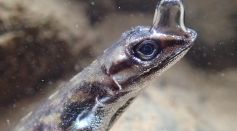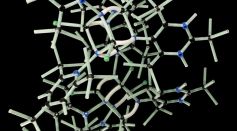Tags: Biology

Neuralink: Can Elon Musk's Brain Chip Implant Create Superhumans?

Face Mask with Biology Sensors Based on CRISPR Enzymes Can Detect COVID-19
Blood Cell Proteins That Deliver Oxygen Related to Cognitive Decline and Brain Aging

Limits on Stem Cell Research Guidelines Revised, Biological Studies to Human Embryos Now Possible
Ancient Plant Fossils Help Explain the Rise of Flowering Plants

Costa Rica Water Lizard Uses Bubble Snouts to Scuba Dive in 16 Minutes
‘Dumbo’ Octopus Living in Pacific Discovered; Researchers Say They Formed Habitat 7,000 Deep

Scientists Discover Technology That Could Detect Human DNA From the Air
MIT Engineers Devise Cost-Effective Nanoimaging Method for Viruses and Biomolecules

Researchers Discover Natural Law That Explains Sharp Structures in Animals
New Nanobiomaterial Inhibits Inflammation, Boosts Neuronal Growth in Mice

MBL Researchers Imaged First Body Plan Moments in the Embryo

Magnetotactic Bacteria May Explain Unique Behaviors in Some Animals
Chemical Used as Defense Against Pests, Used by Moths to Lay Eggs
Florida Boy Dies After Contracting Brain-Eating Amoeba From Lake

Children Whose Parents Are Divorced Have Lower Levels of Love Hormones
How Modern Whales Swim is Linked to the Skeleton of Extinct Dolphin
[VIDEO] New Deep Imaging System Reveals the Insides of the Sea's Weirdest Creatures
Three Boys Hoping to Gain Spiderman's Powers Help Each Other Get Bitten by Poisonous Black Widow: Here's What Happened Next
Satellite Follows ‘Mammoth Journey’ of Five Cuckoos on an Epic Journey
Most Popular

How Electric Vehicles vs Gasoline Cars Compare on Carbon Emissions and Green Transportation

Why Solar Maximum Drives More CMEs: Sunspot Activity and the Solar Cycle 25 Breakdown

How Solar Flares and CMEs Affect Life on Earth: 10 Space Weather Impacts Explained

Are Nanoparticles Really Safe? A Deep Dive into Nanotoxicology and its Environmental Impact




